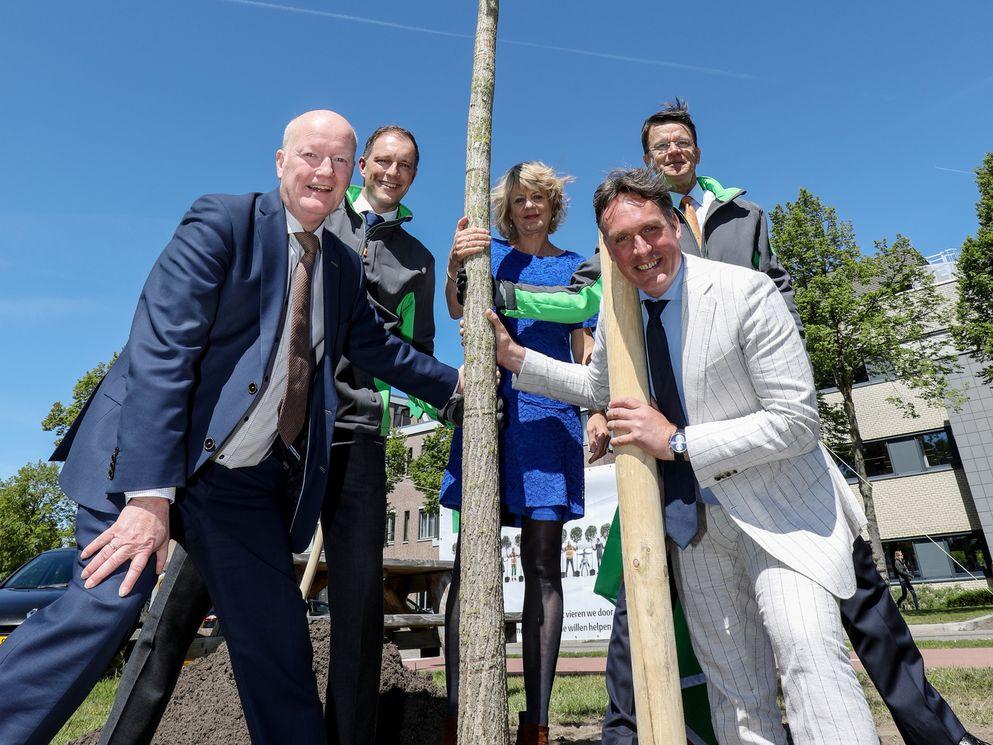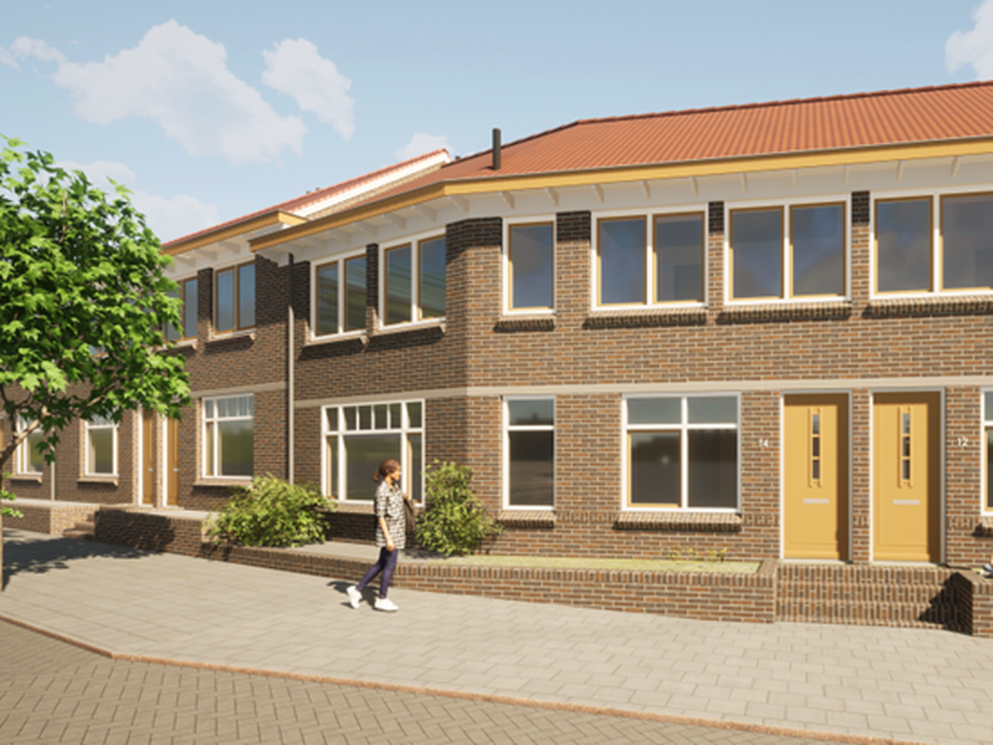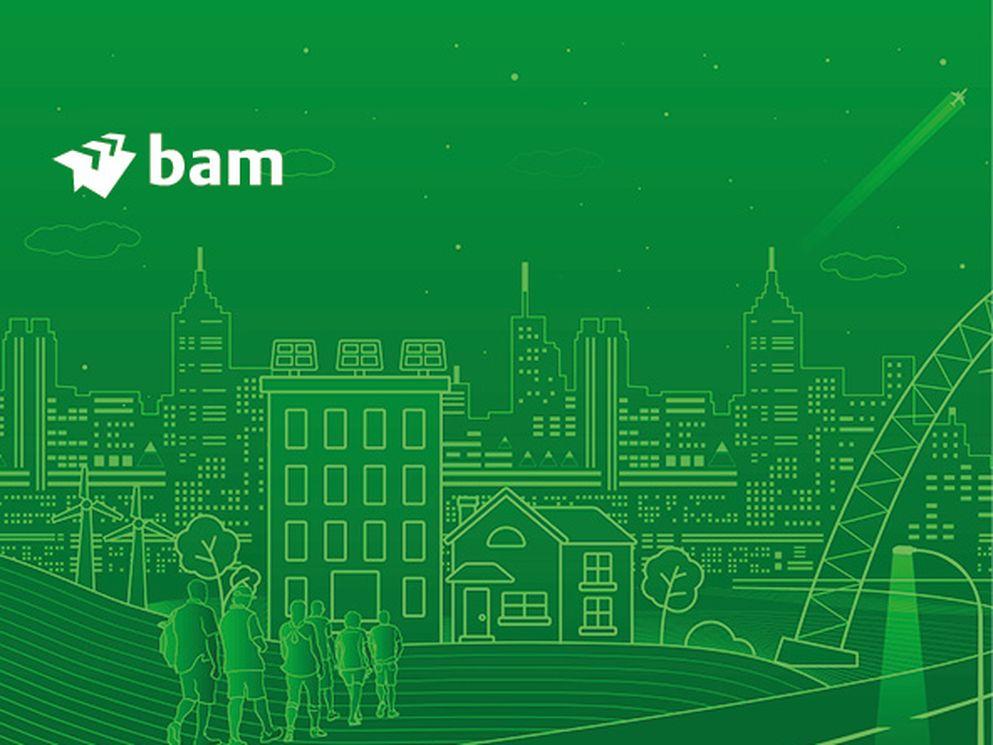BAM donates tree to municipality of Bunnik for its 150th anniversary

Bunnik, the Netherlands, 13 May 2019 – The Executive Board of Royal BAM Group nv and representatives of the municipality of Bunnik have planted a Japanese honey tree (Styphnolobium japonicum) on the occasion of BAM's 150th anniversary. The European construction company BAM is planting 150,000 trees in this anniversary year.
Together, mayor Ruud van Bennekom, alderman Jorrit Eijbersen, Judith van Putten (manager of the green and play areas at the municipality of Bunnik), Lena Euwens (director of Trees for All), BAM CEO Rob van Wingerden and CFO Frans den Houter have given the three-meter-high honey tree its definitive place at Bunnik rail station. The honey tree can reach a height of fifteen metres with a fifteen meter wide egg-shaped crown, which provides shade on the small field on the north side of the station, directly near the BAM offices. The location was chosen by the municipality of Bunnik, in coordination with Mijlpaal 42, an initiative of companies, the municipality of Bunnik, the university, Utrecht Science Park foundation sciences and local residents to upgrade the station area.
More information about the history of BAM and the various anniversary activities can be found at https://www.bam150years.com/en.
Walloon Forest, Houten, the Netherlands
BAM has entered into a partnership with Trees for All for planting the trees. Trees for All is planting around 100,000 trees on reforestation projects in Bolivia and Uganda. In addition, 50,000 trees are being planted in the various European countries where BAM is active.
In the Autumn, Trees for All will plant 10,000 trees on behalf of BAM in the Waalse Bos (‘Walloon Forest’) in Houten. A large part of this forest is affected by the ash branch disease, causing many trees to die. Trees for All collaborates with Staatbosbeheer (the public owner and manager of the Dutch green heritage) on the sustainable restoration of this forest by planting local tree species such as alder, oak, linden, willow, hazel and sweet cherry. These trees are not susceptible to the ash branch disease. Trees for All and Staatsbosbeheer restore a total of eight hectares of sick forest in this area and transform it into a healthy and varied forest that is attractive to both plants, animals and recreation.
Carpentry shop
With an annual turnover of approximately €7 billion, more than 20,000 employees and ten operating companies, BAM is one of the major European construction companies. The history of the company goes back to May 1869, when Adam van der Wal opened a carpentry shop in Groot-Ammers, a farming village in the Alblasserwaard (east of Rotterdam). His son Jan van der Wal started to work as a contractor outside the region in Vlaardingen and The Hague, where he finally settled. The third generation Van der Wal – Joop van der Wal, born in 1902 – joined his father in 1926 after studying civil engineering in Delft. The company name was changed to Fa. J. van der Wal and Son. In 1927 the family business was converted into a limited liability company 'N.V. Bataafsche Aanneming Maatschappij van Bouw- en Betonwerken v/h J. van der Wal and Zoon' (soon shortened to ‘BAM'). The company has been listed in Amsterdam since 1959. On 31 March 1971, the company name was changed to BAM Verenigde Bedrijven N.V. (from 1973: BAM Holding N.V.). The name Bataafsche Aanneming Maatschappij remained in use for the non-residential construction activities until 1992. After that, BAM was no longer used as an abbreviation, but as the company’s official name. BAM’s history is characterised by the acquisition of many smaller and larger construction firms. After taking over the building division of the Bredero group in 1988, BAM moved its office from Zeist to Bunnik.
Further information: Niels van Dongen, niels.van.dongen@bam.com, or Arno Pronk, arno.pronk@bam.com, +31 (0)30 659 86 23.



